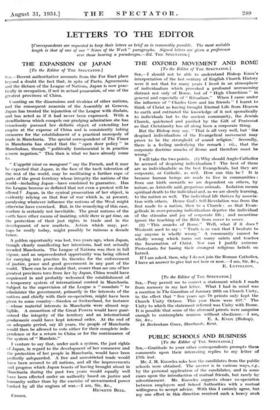LETTERS TO THE EDITOR
[Correspondents are requested to keep their letters as brief as is reasonably possible. The most suitable length is that of one of our " News of the Week " paragraphs. Signed letters are given a preference over those bearing a pseudonym.—Ed. THE SPECTATOR.]
THE EXPANSION OF JAPAN
[To the Editor of THE SPECTATOR.] SIR.—Reeent authoritative accounts from the Far East place beyond a doubt the fact that, in spite of Pacts, Agreements and the dictum of the League of Nations, Japan is now prac- tically in occupation, if not in actual possession, of one of the greatest provinces of China.
Counting on the dissensions and rivalries of other nations, and the consequent anaemia of the Assembly at Geneva, Japan has treated the injunction of the League with disdain, and has acted as if it had never been expressed. With a steadfastness which compels our grudging admiration she has tenaciously pursued her definite object of extending her empire at the expense of China and is consistently taking measures for the establishment of a practical monopoly of trade in Manchuria. The special correspondent of The Times in Manchuria has stated that the " open door policy " in Manchukuo, though " politically fundamental is in practice a mere negation." This then is what we have already come to.
" L'appetit vient en mangeant " say the French, and it may be expected that Japan, in the face of the tacit toleration of the rest of the world, may be meditating a further rape of parts of the great territory whose integrity the nations of the world—including Japan—have combined to guarantee. Has the League become so deflated that not even a protest will be offered ? Japan, in the cynical prosecution of her object, is evidently relying on that fear of war which is, at present, paralysing whatever influence the nations of the West might otherwise have exercised. But, in the remedying of this case; warfare is certainly not inevitable. The great nations of the earth have other means of insisting, while there is yet time, on the protection of their just rights in trade and in the development of new markets. Action which may, per- haps be costly today, might possibly be ruinous a decade hence.
A golden opportunity was lost, two years ago, when Japan, though clearly manifesting her intentions, had not actually invaded Manchuria. The League of Nations was then in full vigour, and an unprecedented opportunity was being offered for carrying into practice its theories for the enforcement of justice, peace and good government in any part of the world. There can be no doubt that, sooner than see one of her greatest provinces torn from her by Japan, China would have acquiesced in and probably welcomed the establishment of a temporary system of international control in Manchuria. Subject to the supervision of the League a " mandate " to administer the government, primarily in the interests of the natives and chiefly with their co-operation, might have been given to some country—Sweden or Switzerland, for instance —whose material interests in Manchuria were almost neg- ligible. A consortium of the Great Powers would have guar- anteed the integrity of the territory and an international gendarmerie could have kept internal order. At the end of an adequate period, say 25 years, the people of Manchuria would then be allowed to vote either for their complete inde- pendence or for a return to China or for the continuance of the system of " Mandate."
I venture to say that, under such a system, the just rights of Japan, in regard to the development of her commerce and the protection of her people in Manchuria, would have been perfectly safeguarded. A free and unrestricted trade would have been secured to all nations, and all the improvements and progress which Japan boasts of having brought about in Manchuria during the past two years would equally well have been effected under an authority based on justice and humanity rather than by the exercise of unwarranted power backed by all the engines of war.—I am, Sir, &c.,






































 Previous page
Previous page